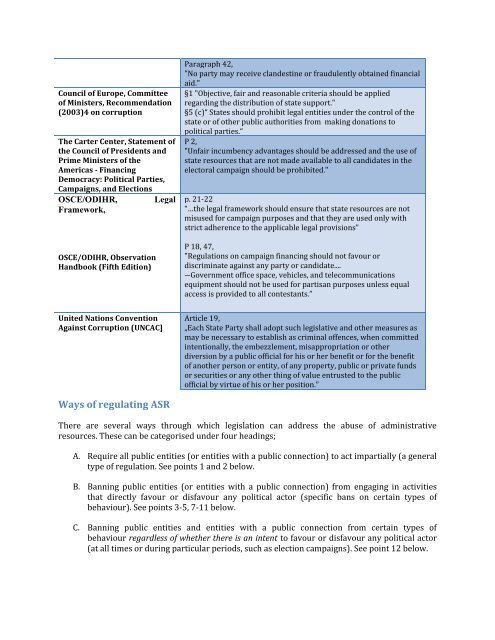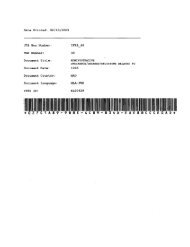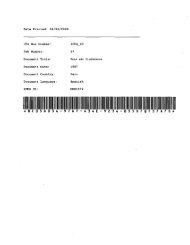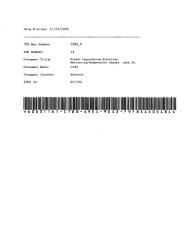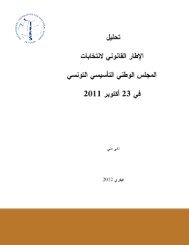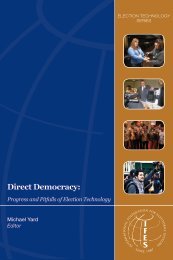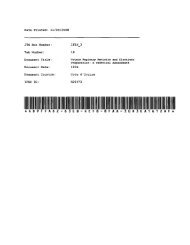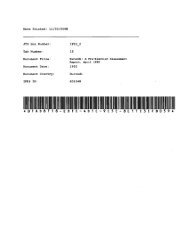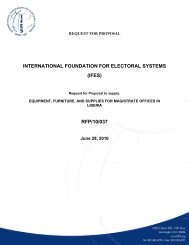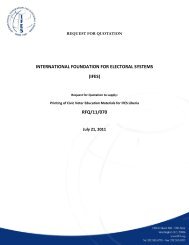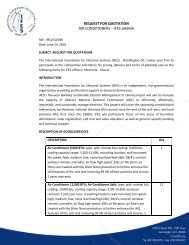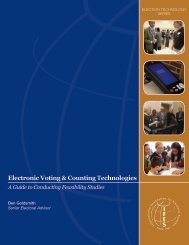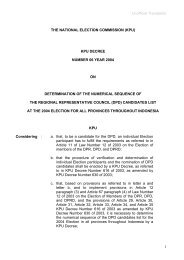ABUSE OF STATE RESOURCES - IFES
ABUSE OF STATE RESOURCES - IFES
ABUSE OF STATE RESOURCES - IFES
You also want an ePaper? Increase the reach of your titles
YUMPU automatically turns print PDFs into web optimized ePapers that Google loves.
Council of Europe, Committee<br />
of Ministers, Recommendation<br />
(2003)4 on corruption<br />
The Carter Center, Statement of<br />
the Council of Presidents and<br />
Prime Ministers of the<br />
Americas - Financing<br />
Democracy: Political Parties,<br />
Campaigns, and Elections<br />
OSCE/ODIHR, Legal<br />
Framework,<br />
OSCE/ODIHR, Observation<br />
Handbook (Fifth Edition)<br />
Paragraph 42,<br />
"No party may receive clandestine or fraudulently obtained financial<br />
aid."<br />
§1 "Objective, fair and reasonable criteria should be applied<br />
regarding the distribution of state support."<br />
§5 (c)“ States should prohibit legal entities under the control of the<br />
state or of other public authorities from making donations to<br />
political parties.“<br />
P 2,<br />
"Unfair incumbency advantages should be addressed and the use of<br />
state resources that are not made available to all candidates in the<br />
electoral campaign should be prohibited."<br />
p. 21-22<br />
“…the legal framework should ensure that state resources are not<br />
misused for campaign purposes and that they are used only with<br />
strict adherence to the applicable legal provisions”<br />
P 18, 47,<br />
"Regulations on campaign financing should not favour or<br />
discriminate against any party or candidate....<br />
―Government office space, vehicles, and telecommunications<br />
equipment should not be used for partisan purposes unless equal<br />
access is provided to all contestants.”<br />
United Nations Convention<br />
Against Corruption (UNCAC]<br />
Article 19,<br />
„Each State Party shall adopt such legislative and other measures as<br />
may be necessary to establish as criminal offences, when committed<br />
intentionally, the embezzlement, misappropriation or other<br />
diversion by a public official for his or her benefit or for the benefit<br />
of another person or entity, of any property, public or private funds<br />
or securities or any other thing of value entrusted to the public<br />
official by virtue of his or her position.”<br />
Ways of regulating ASR<br />
There are several ways through which legislation can address the abuse of administrative<br />
resources. These can be categorised under four headings;<br />
A. Require all public entities (or entities with a public connection) to act impartially (a general<br />
type of regulation. See points 1 and 2 below.<br />
B. Banning public entities (or entities with a public connection) from engaging in activities<br />
that directly favour or disfavour any political actor (specific bans on certain types of<br />
behaviour). See points 3-5, 7-11 below.<br />
C. Banning public entities and entities with a public connection from certain types of<br />
behaviour regardless of whether there is an intent to favour or disfavour any political actor<br />
(at all times or during particular periods, such as election campaigns). See point 12 below.


